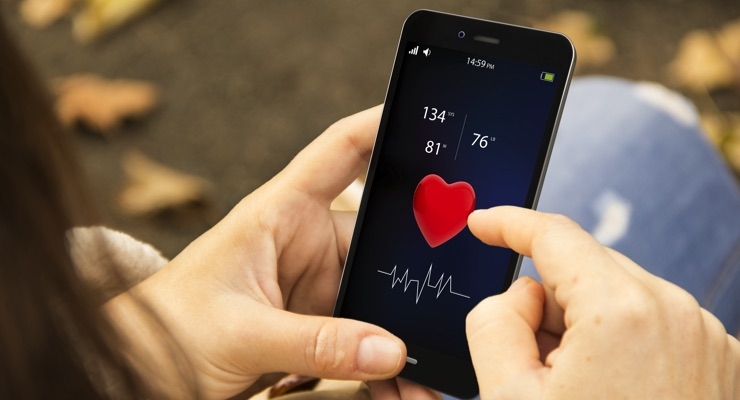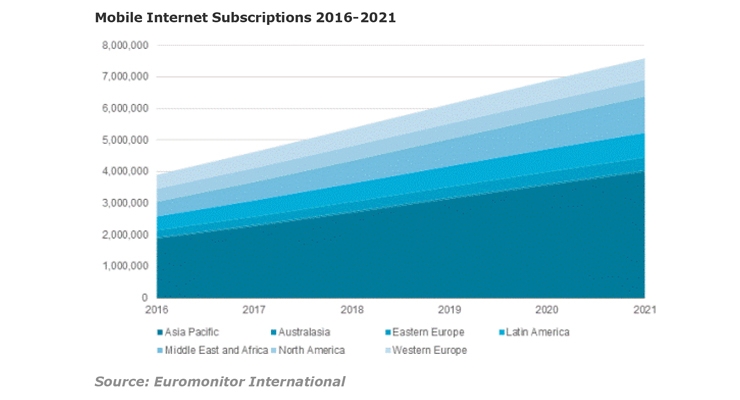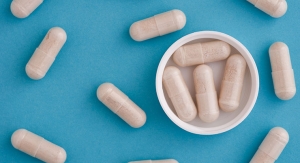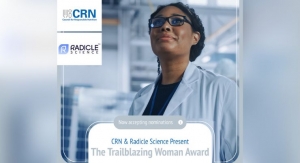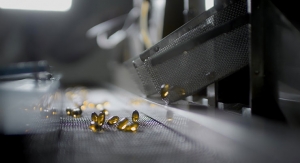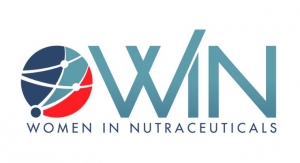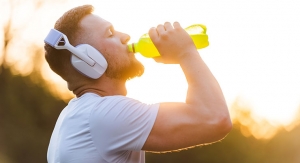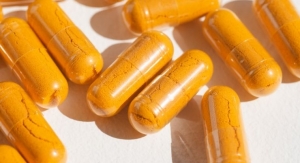Carolina Ordonez, Industry Analyst - Consumer Health, Euromonitor International02.23.17
The ever changing and evolving worlds of online platforms and mobile connectivity have been revolutionizing the way consumers connect and communicate with brands and services as well as increasingly impacting the way businesses, and startups in particular, get their products to market. Consumer health is no exception, according to Euromonitor analysis.
In a world where mobile Internet subscriptions are projected to go from 3.9 billion to 7.6 billion from 2016 to 2021, the mConsumer (i.e., mobile consumer) will rise in tandem with mobile connectivity, and smarter consumer health products and regulations.
mConsumer needs are evolving fast and revolutionizing the field of health. This is changing the way healthcare providers communicate with consumers. From new mHealth apps and the rise of health startups to 3D printing pills and artificial intelligence (AI), the healthcare industry needs to catch up fast.
Furthermore, the evolving online goods and services providers have been developing platforms that connect research and development with businesses and laboratories, making it faster and more cost efficient to get products through the test stages and into the market. Thus, in the rising world of business startups efficiently utilizing new online tools, consumer health's entry barriers are decreasing for startups as well as multinationals.
The Main Medical Device: A Smart Phone
During this new era of digital consumerism, mConsumers are tackling fitness goals with apps that serve as trainers and eating what Lark, an AI personal weight loss coach app, recommends. At the same time, mConsumers are texting their doctors 24/7 because they pay a monthly subscription to have access any time. They can also help others during health emergencies because they carry mHealth apps that detect different conditions, even a heart attack.
The mConsumer uploads their digital health data and genome map to their doctor's cloud and they discuss their health during routine annual checks. Based on this data, they buy consumer health products that are 3D printed and customized to their specific needs and participate in science trials by using a network-oriented research assistant (NORA).
mConsumers do all of this through their main medical device: a smart phone. And this is disrupting the whole healthcare industry.
With “smarter” smart phones and mConsumers growing fast, a wave of new health developments and ad hoc regulations will follow.
As mConsumers become more conscious and empowered about their health, and health devices keep multiplying, the FDA is considering a "pre-check like system" of quality controls for developers working on the creation of medical device software, modeled after the Transportation Security Administration's expedited security screening process at U.S. airports (i.e., like a TSA pre-check). In the future, it is expected the FDA will consider a similar system for other medical products so they can reach mConsumers faster.
Another area that is growing fast and will connect with mConsumers is the 3D printing of drugs and vitamins. In fact, the FDA has already approved a 3D printed drug used for epilepsy called Spritam (from Aprecia Pharmaceuticals). The company uses a proprietary 3D printing process designed to allow delivery of high-dose medication in a fast disintegrating form. Looking forward, it is likely that the mConsumer will be able to customize 3D printed drugs and vitamin supplements from their mobile devices.
Multiply Labs for example, is developing a 3D printed vitamin supplement that can be customized to individual dietary needs and has time-released nutrition. The company states its capsules are printed with a patent-pending pharmaceutical polymer to control the release of nutrients at specific intervals through the day. The technique allows consumers to swallow just one pill instead of several pills at different times. It is expected to see companies taking this technology one step further, and not only customizing products based on dietary needs, but based on all data gathered by the mConsumer (e.g., a drug or vitamin based on genetic, mental, heart, liver, and gut health needs).
In the future, we can expect a rise of FDA pre-checks and growth of 3D printing drugs and vitamin supplements based on data gathered by mConsumers. This will generate even greater disruption in the healthcare system because more doctors will need to start processing this new mConsumer deluge of data, making recommendations that are 100% customized.
mConsumer Needs & Future Companies’ Strategies
With the growth of mConsumers caring more about health, it is crucial for consumer health companies to understand what other products or services they could provide based on their existing strengths to match the new mConsumer's needs. Some of these will involve AI applied to different areas, from 3D printing drugs to cognitive computing technologies and mHealth apps, among others.
Another area where consumer health companies will keep growing is through mobile sales. The key for consumer health companies to continue rising might be to become a sort of Amazon or eBay for consumer health products and services, where mConsumers could customize supplements and apps based on their needs, accessing medical support via a subscription and even get non-emergency medical transportation.
Online Tools & the Rise of Startups
Another critical factor for companies to keep in mind is the exponential growth of startups launching new consumer health products faster than ever before. This is being helped by new technologies and online platforms that allow startups to outsource research and development processes with companies like Scientist.com and Conversant Bio.
Scientist.com, often referred to as the "Amazon.com for medical research," partners with small and large pharma and biotech firms, government research institutes, and university core facilities among others, so companies can outsource medical investigation. Meanwhile, Conversant Bio offers human clinical samples, cancer tissue, fresh whole blood, and bone marrow mononuclear cells, among other type of samples.
Hence, startups can also get the samples they need, online, and get them shipped within 48 hours, which significantly speeds up the process and allows for a faster path to the final product and to the consumer market.
Mobile connectivity, the mConsumer, and customized consumer health products and services will continue to rise through online and mobile platforms, along with startups taking advantage of online tools for faster product developments. These new innovations will likely lead to new regulations. Furthermore, they will increasingly affect the consumer health industry, shake the healthcare space and competitive environment, as well as challenge healthcare providers to handle a multitude of new customized data.
 For more insight, contact Carolina Ordonez, consumer health analyst at Euromonitor International, at carolina.ordonez@euromonitor.com or on Twitter.
For more insight, contact Carolina Ordonez, consumer health analyst at Euromonitor International, at carolina.ordonez@euromonitor.com or on Twitter.
In a world where mobile Internet subscriptions are projected to go from 3.9 billion to 7.6 billion from 2016 to 2021, the mConsumer (i.e., mobile consumer) will rise in tandem with mobile connectivity, and smarter consumer health products and regulations.
mConsumer needs are evolving fast and revolutionizing the field of health. This is changing the way healthcare providers communicate with consumers. From new mHealth apps and the rise of health startups to 3D printing pills and artificial intelligence (AI), the healthcare industry needs to catch up fast.
Furthermore, the evolving online goods and services providers have been developing platforms that connect research and development with businesses and laboratories, making it faster and more cost efficient to get products through the test stages and into the market. Thus, in the rising world of business startups efficiently utilizing new online tools, consumer health's entry barriers are decreasing for startups as well as multinationals.
The Main Medical Device: A Smart Phone
During this new era of digital consumerism, mConsumers are tackling fitness goals with apps that serve as trainers and eating what Lark, an AI personal weight loss coach app, recommends. At the same time, mConsumers are texting their doctors 24/7 because they pay a monthly subscription to have access any time. They can also help others during health emergencies because they carry mHealth apps that detect different conditions, even a heart attack.
The mConsumer uploads their digital health data and genome map to their doctor's cloud and they discuss their health during routine annual checks. Based on this data, they buy consumer health products that are 3D printed and customized to their specific needs and participate in science trials by using a network-oriented research assistant (NORA).
mConsumers do all of this through their main medical device: a smart phone. And this is disrupting the whole healthcare industry.
With “smarter” smart phones and mConsumers growing fast, a wave of new health developments and ad hoc regulations will follow.
As mConsumers become more conscious and empowered about their health, and health devices keep multiplying, the FDA is considering a "pre-check like system" of quality controls for developers working on the creation of medical device software, modeled after the Transportation Security Administration's expedited security screening process at U.S. airports (i.e., like a TSA pre-check). In the future, it is expected the FDA will consider a similar system for other medical products so they can reach mConsumers faster.
Another area that is growing fast and will connect with mConsumers is the 3D printing of drugs and vitamins. In fact, the FDA has already approved a 3D printed drug used for epilepsy called Spritam (from Aprecia Pharmaceuticals). The company uses a proprietary 3D printing process designed to allow delivery of high-dose medication in a fast disintegrating form. Looking forward, it is likely that the mConsumer will be able to customize 3D printed drugs and vitamin supplements from their mobile devices.
Multiply Labs for example, is developing a 3D printed vitamin supplement that can be customized to individual dietary needs and has time-released nutrition. The company states its capsules are printed with a patent-pending pharmaceutical polymer to control the release of nutrients at specific intervals through the day. The technique allows consumers to swallow just one pill instead of several pills at different times. It is expected to see companies taking this technology one step further, and not only customizing products based on dietary needs, but based on all data gathered by the mConsumer (e.g., a drug or vitamin based on genetic, mental, heart, liver, and gut health needs).
In the future, we can expect a rise of FDA pre-checks and growth of 3D printing drugs and vitamin supplements based on data gathered by mConsumers. This will generate even greater disruption in the healthcare system because more doctors will need to start processing this new mConsumer deluge of data, making recommendations that are 100% customized.
mConsumer Needs & Future Companies’ Strategies
With the growth of mConsumers caring more about health, it is crucial for consumer health companies to understand what other products or services they could provide based on their existing strengths to match the new mConsumer's needs. Some of these will involve AI applied to different areas, from 3D printing drugs to cognitive computing technologies and mHealth apps, among others.
Another area where consumer health companies will keep growing is through mobile sales. The key for consumer health companies to continue rising might be to become a sort of Amazon or eBay for consumer health products and services, where mConsumers could customize supplements and apps based on their needs, accessing medical support via a subscription and even get non-emergency medical transportation.
Online Tools & the Rise of Startups
Another critical factor for companies to keep in mind is the exponential growth of startups launching new consumer health products faster than ever before. This is being helped by new technologies and online platforms that allow startups to outsource research and development processes with companies like Scientist.com and Conversant Bio.
Scientist.com, often referred to as the "Amazon.com for medical research," partners with small and large pharma and biotech firms, government research institutes, and university core facilities among others, so companies can outsource medical investigation. Meanwhile, Conversant Bio offers human clinical samples, cancer tissue, fresh whole blood, and bone marrow mononuclear cells, among other type of samples.
Hence, startups can also get the samples they need, online, and get them shipped within 48 hours, which significantly speeds up the process and allows for a faster path to the final product and to the consumer market.
Mobile connectivity, the mConsumer, and customized consumer health products and services will continue to rise through online and mobile platforms, along with startups taking advantage of online tools for faster product developments. These new innovations will likely lead to new regulations. Furthermore, they will increasingly affect the consumer health industry, shake the healthcare space and competitive environment, as well as challenge healthcare providers to handle a multitude of new customized data.


